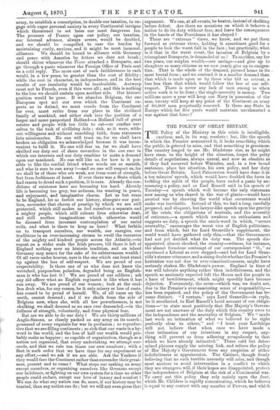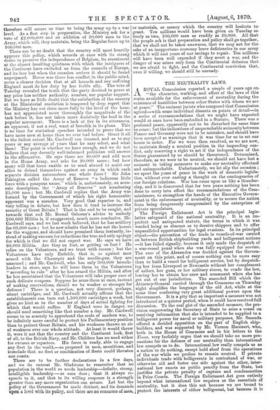THE POLICY OF GREAT BRITAIN.
THE Policy of the Ministry in this crisis is intelligible, cautious, and, in its way, resolute ; but, like the speech in which the Premier announced it, it lacks something which the public is grieved to miss, and that something is greatness. The country longed to see Mr. Gladstone rise, as he might have risen, to the height of the situation, forget the petty details of negotiations, always unreal, and now as obsolete as if they bad occurred before Waterloo, and, in a few broad sentences, place her situation, his own policy, and her duty before Great Britain. Lord Palmerston would have done it in a ten minutes' speech, which would have doubled the force in trebling the spirit of the people, have ended a panic by an- nouncing a policy, and as Earl Russell said in his speech of Tuesday—a speech which well became the only statesman now among us who shared in the war of giants—would have averted war by showing the world what occurrence would make war inevitable. Instead of this, we had a long, carefully prepared, and eloquent, but lawyer-like speech upon the gravity of the crisis, the obligations of neutrals, and the necessity of reticence,—a speech which awakens no enthusiasm and suggests no duty, a speech the catch-word in which, "secure neutrality," encourages the worst vice of English politicians, and from which, but for Lord Granville's supplement, the world would have gathered only this,—that the Government had not yet decided what its duty was. The speech dis- appointed, almost shocked, the country—witness, for instance, the almost ferocious contempt of our correspondent "0.," as convinced a Liberal as ever stepped—and but for Lord Gran- ville's sterner utterance, and a rising doubtwhether the Premier's hesitation was not due to over-conscientiousness, might have seriously shaken Mr. Gladstone's power. England in time of war will tolerate anything rather than indefiniteness, and the speech so anxiously expected left the House and the people in a haze of bewilderment, which might speedily have become dejection. Fortunately, the error—which was, we doubt not, due to the Premier's over-mastering sense of responsibility— has been repaired, and the policy of the Government has be- come distinct. "I venture," says Lord Granville—in reply, be it recollected, to Earl Russell's lucid account of our obliga- tions—" to state most positively that Her Majesty's Govern- ment are not unaware of the duty which this country owes to the independence and the neutrality of Belgium." We "made last week an intimation of what we believed to be right perfectly clear to others," and "I trust your Lordships will not believe that when once we have made a clear intimation of our intentions in any respect, any- thing will prevent us from adhering scrupulously to that which we have already intimated." Those cold but deter- mined phrases supply the missing link, and relieve the policy of Her Majesty's Government from any suspicion of either indefiniteness or apprehension. The Cabinet, though firmly believing that no such terrible necessity will arise, and though most anxious to avoid intervention in a conflict to which they are strangers, will, if their hopes are disappointed, protect the independence of Belgium at the risk of a Continental war. To carry out this policy they rely mainly upon the fleet, which Mr. Childers is rapidly concentrating, which he believes is equal to any contest with any number of Powers, and which therefore will secure us time to bring the army up to a war level. As a first step in preparation, the Ministry ask for a vote of £2,000,000 and an addition of 20,000 men to the Army, which will, they maintain, bring the Regular force up to 100,000 men.
There can be no doubt that the country will most heartily approve this policy, which accords at once with its strong desire to preserve the independence of Belgium, its resentment at the almost insulting quietness with which the intriguers of the Continent have excluded us from the councils of Europe, and its fear lest when the occasion arrives it should be found unprepared. Never was there less conflict in the public mind, never a clearer decision that at all hazards and any suffering England must do her duty by her feeble ally. The vote of Tuesday revealed the truth that the party devoted to peace at any price has neither authority, number, nor popular support. But we have as little doubt that the satisfaction of the country at the Ministerial resolution is tempered by deep regret that the Ministry has not risen more fully to the level of the hour, has not appreciated more thoroughly the magnitude of the task before it, has not taken more decisively the lead in the popular movement. There is a lack of fire in its utterances, an apparent, if not a real, want of breadth in its plans. This is no time for statistical speeches intended to prove that we have more men at home than we ever had before. Grant it all to the fullest extent Mr. Cardwell can demand, and as to any years or any average of years that he may select, and what then? The point is whether we have enough, and we do not believe that any decently well-informed politician will answer in the affirmative. He says there are 80,000 and odd men in the Home Army, and asks for 20,000 more ; but how many will that force enable us to send abroad to assist our allies to defend themselves against an army in which each separate division outnumbers our whole force ? Sir John Pakington called the Army of Reserve "a ludicrous little force with a pompous name," which is, unfortunately, an accu- rate description, the "Army of Reserve" not numbering 25,000 men ; but Mr. Cardwell replies that the Army was formed by the Government of which his right honourable opponent was a member. Very good that repartee is, and very telling in debate, but how does it tend to increase the security of Great Britain ? That is the end to be sought, and towards that end Mr. Bernal Osborne's advice to embody 200,000 Militia is, if exaggerated, much more conducive. Mr. Cardwell says, and we last week believed, that he has artillery for 60,000 men ; but he now admits that he has not the horses for the waggons, and should have promised them instantly, in- stead of making excuses for reductions the true and only apology for which is that we did not expect war. He says we have 80,000 Militia. Are they on foot, or getting on foot ? He relies on the Volunteers, and we trust with reason ; but the Volunteers have only Enfields, that is, as against men armed with the Chassepot and the needle-gun, they are unarmed ; and Mr. Cardwell, who has only 300,000 breech- loaders in store, says he will issue them to the Volunteers "according to rule" after he has armed the Militia, and after he has ascertained that the Volunteers will take proper care of such delicate weapons. Suppose he arms them at once, instead of making reservations, should we be weaker or stronger for defence ? There is a question, not very discreet, perhaps, about cartridges, and Mr. Cardwell actually affirms that the establishments can turn out 1,500,000 cartridges a week, but gives no hint as to the number of days of actual fighting for which that would suffice. If England were in danger, we should need something like that number a day. Mr. Cardwell seems to us scarcely to apprehend the scale of modern war, to be infinitely more careful to protect his Parliamentary position than to protect Great Britain, and his weakness throws an air of weakness over our whole attitude. At least it would throw it, were it not that the country and the Continent look, first of all, to the British Navy, and Mr. Childers has no need either for excuses or repartees. His force is ready, able to engage any fleet in the world,--so prepared in men, munitions, and ironclads that no fleet or combination of fleets could threaten our coasts.
There are to be further declarations in a few days, and we do entreat Mr. Gladstone to remember that no population in the world so needs leadership—definite, strong, intelligible leadership — as ours does ; that it always re- sponds to it, and that in its willing response is a strength greater than any mere organization can secure. Let but the policy of the Government be made distinct, and its demands upon a level with its policy, and there are no resources of oaen, or materials, or money which the country will hesitate to. grant. Ten millions would have been given on Tuesday as- freely as two, 100,000 men as readily as 20,000. All that. the people ask is that preparation and policy shall go together,. that we shall not be taken unawares, that we may not for the sake of an inopportune economy leave deficiencies in our array' which it will cost years of our savings to repair.. Ten millions. will have been well expended if they avert a war, and the danger of war arises only from the Continental delusion that we are afraid to fight, and the Continental conviction that,. even if willing, we should still be unready.































 Previous page
Previous page